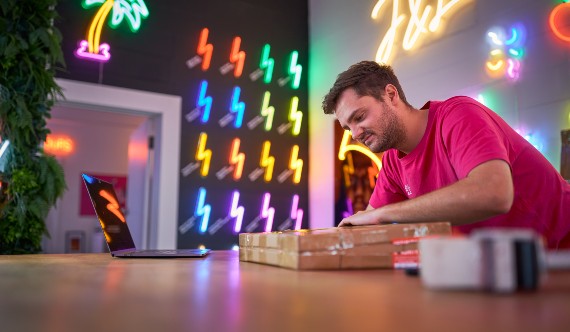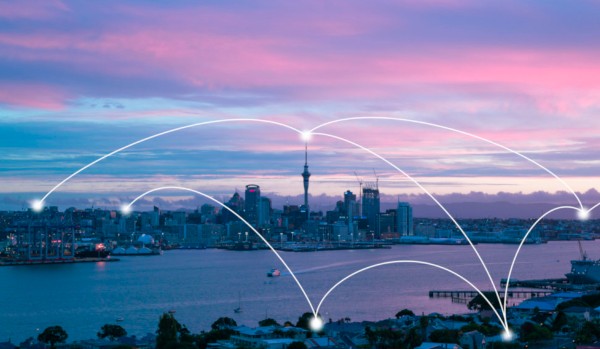What is IoT?
The Internet of Things represents a technological revolution in multiple sectors of the economy.
It's also just about the oldest hot new thing you've ever seen.
The Internet of Things – IoT for short – is the meeting of information systems, networks and electrical engineering. Nearly every internet-connected device that sends or receives data but isn't a computer, phone or television is effectively part of it. Whether something is a standalone product or embedded in an everyday object, it's part of IoT.
The history of IoT
IoT goes back longer than you might think. We've been connecting electronic devices almost as long as we've had them. By 1874, the French government had a system of sensors that sent information about the weather and snow depth on Mont Blanc to Paris. We've been remotely monitoring earthquakes and power stations for nearly as long. This was the birth of telemetry.
The first "thing" in the Internet of Things actually appeared years before most of us got online. And it wasn't just a gimmick; it solved a real problem.
Like coders the world over, the programming team at the computer science department at Carnegie Mellon University in Pittsburgh liked a good caffeinated beverage. For most of the 1970s, there was a Coca-Cola vending machine in the department's main terminal room. But when the department expanded, most of the programmers found themselves on a different floor from the Coke machine.
Read the history of Carnegie Mellon's Coke machine
The programmers didn't like going all that way to find the machine empty. So in 1982, a couple of staff members worked out a solution. They installed sensors in the machine and connected them to the main departmental computer. They could check the machine's status without having to walk there. Bazinga!
But there was more. Someone made a server program that showed how long the Coke bottles had been on each shelf. This program told the team how long the bottles had had to chill. So you not only knew whether the machine was stocked, but also where to find the cold ones.
But when Coca-Cola changed its bottles, all this came to a halt, including the machine itself. Thousands of kilometres away in New Zealand, a new chapter was brewing.
First IoT in New Zealand
In 1990, Peter Munn took voluntary redundancy from Telecom New Zealand and began looking for ways to turn his love of electronics into a business opportunity. That became Masterton-based Harvest Electronics.
Peter tried to sell a security alarm company a new monitoring system that used packet-switched connections rather than the existing dial-up service (which incurred a toll-call charge every time alarms were reset). But in the end, he couldn't get the idea over the line.
"I wondered, what else could we use this alarm panel that we'd developed. And I thought, what about Coke machines? I thought they'd be interested in getting alarms if someone broke into their Coke machine or whatever."
It turned out that what Coca-Cola really wanted was its own version of what the Carnegie Mellon programmers had done – stock control. So Peter and his engineering partner Gary Anderson (the "Woz" to Peter's Steve Jobs) quickly re-tooled their system. Twenty monitored machines went into Wellington, then 2,000 into Sydney. Harvest was on its way.
"Coke got a huge return on their investment. It wasn't a gimmick, it was something that they needed. I approached them because I thought they might be interested in security – but they were interested in stock. And so we very quickly had to change direction, but we solved the problem that they really needed solving."
Harvest spun off the vending machine part of the business in 2000. Now, the company provides everything from frost alarms for orchardists to monitored alarms at KiwiRail crossings.
"We wake up about five thousand people on a frosty night," says Peter.
Peter frets about "junk" IoT devices flooding the consumer market, but remains convinced of the business benefits of IoT.
"Enduring industrial products, I think, will be the things that most improve companies' productivity."
Spark and IoT
And those products have reached a price point where they can be widely deployed, says Paul Caples, product owner for IoT at Spark.
"A lot of different events have occurred in the market over the last several years," says Paul. "It's on the back of the fact that there are seven billion smartphones out there. And that's meant that there's been a lot of development of sensors and chips, which has driven down the cost of those components. Mobile phones created the market and the volume in the market that's allowed the price points to get down to where they are. And now a lot of the tools are there in the cloud services. So a lot of the barriers to entry have disappeared."
Futurist Frances Valintine says the IoT case for consumers won't be the current wave of Bluetooth-enabled knick-knacks – you probably don't need an internet-connected toothbrush. She envisions more sophisticated home automation systems, sold under a software-as-a-service (SaaS) model.
"What it comes back to is, people want better information," says Frances. "And it doesn't matter if you want the ideal smart house scenario where you know exactly how much power you really need and what rooms you should be heating, all that information is going to make people's lives better. And of course businesses will pop up off the back of that. They'll say, we'll give you that dashboard view, so you don't have to go and buy a whole lot of different IoT devices or connections."
Paul and Frances agree that IoT is changing, and it isn't going away.





